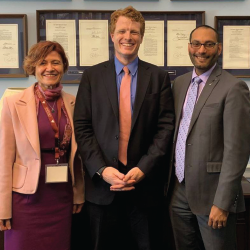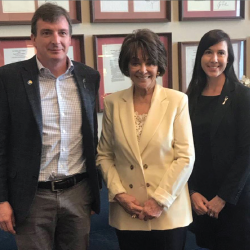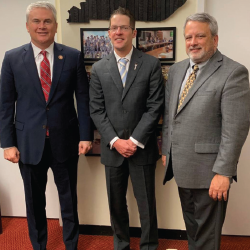
BadBrother / shutterstock.com
WASHINGTON, D.C.—Dozens of rheumatology leaders met with more than 100 politicos on Capitol Hill in mid-May as part of the ACR’s annual Advocacy Leadership Conference. Armed with research and advocacy training concerning a handful of important issues, rheumatologists, rheumatology interprofessional team members, government affairs specialists and others met with federal lawmakers, legislative aides and correspondents.
The two-day conference, which featured the May 16 Hill meetings, is one of two major organized events during which rheumatology leaders descend on Washington to meet with federal lawmakers. Unlike September’s Advocates for Arthritis event, this event did not include patients; instead, the leaders advocated for these issues:
Issue 1: Support for the Safe Step Act to Counter Step Therapy
This act would create a clear and transparent process for many patients to get exceptions to step therapy (or fail first), require insurers to consult patient medical histories and with providers before denying medically necessary treatments, and establish a clear and reasonable time frame for over-ride decisions.
Issue 2: Stabilization of the Rheumatology Workforce in the Long Term
The ACR is asking legislators to pass legislation that would provide loan repayment for pediatric subspecialists (including in rheumatology) and address pediatric public health disparities in children’s hospitals’ graduate medical education programs. These initiatives would help counter a trend that shows the projected demand for rheumatologists far exceeding the supply over the next dozen years.
Issue 3: Prior Authorization Reform
The ACR is asking for legislation that would improve the transparency and efficiency of the prior authorization process, helping patients access care without facing dangerous delays. Congress should require prior authorization be standardized and allow for electronic options, force insurance companies to reveal coverage restrictions levied at the point of care and eliminate prior authorization altogether for the most-approved therapies. (A House bill was introduced June 5.)
Issue 4: Improved Access to Osteoporosis Testing in Medicare
A sustainable payment for dual-energy X-ray absorptiometry (DXA) bone density scans conducted in physicians’ offices needs to be established. Medicare reimbursement for DXA scans has dropped by 70% over the past decade, and active payment rates don’t cover physicians’ costs to provide this service. (A Senate bill was introduced in January, and a House bill in May.)
Issue 5: Invest in Arthritis Research at the U.S. Department of Defense (DoD)
The ACR is asking for the appropriation of a dedicated $20 million line item in the DoD research program’s budget. That program lacks funding earmarked for arthritis research, despite listing similar dedicated budgets for other diseases—and despite arthritis being a major condition afflicting U.S. service members.
Meeting Outcomes
Participants converged on D.C. May 15 to meet each other and ACR staff, discuss these issues and undergo a few hours of advocacy training at a hotel just north of the Congressional buildings. That night, the conference also included an advocacy dinner featuring a speech by Sen. Susan Collins (R-Maine).
After breakfast on May 16, participants split into small groups divided by delegation and headed to the Hill. Most groups met with staff or leaders of at least a few Congressional offices over the next few hours. The final tally: 67 rheumatology leaders spoke with a combined 110 Congressional personnel. The ACR leaders represented the ACR’s Board of Directors, Affiliate Society Council, Government Affairs Committee, Committee on Rheumatologic Care, RheumPAC and the Insurance Subcommittee; they came from 31 states and D.C.
The Rheumatologist trailed the group from Pennsylvania. The crew included rheumatologists Ethan Craig, MD, MHS, University of Pennsylvania Division of Rheumatology (Philadelphia); Paul Killian, MD (Monroeville); and Jay Mehta, MD, MS, clinical director of pediatric rheumatology at Children’s Hospital of Philadelphia and chair of the ACR’s Pediatric Rheumatology Special Committee. Donah Crawford, MA, a rheumatology patient and research coordinator with Arthritis Group Rheumatology of Philadelphia, completed the foursome.
They met inside a ballroom of the Hamilton Hotel at 8 that morning, with the men sporting suits and ties, and Ms. Crawford a business suit. After breakfast, they traveled to a Senate office building for their first meeting, with a staffer from Republican Senator Pat Toomey’s office. During the 15-minute ride, they expressed some doubt about their ability to influence Congress—particularly with so many other groups visiting lawmakers via similar events annually. “Maybe,” Ms. Crawford said, “this will be the time.”
The group met with Corey Ensslin, a legislative correspondent with Sen. Toomey’s office, for about 20 minutes, sitting at a long conference table headed by Mr. Ensslin in a well-lit room. Mr. Ensslin asked why more residents don’t specialize in pediatric rheumatology, promised to look into other issues and jotted notes in a notebook. After the meeting, as the group walked down a dimly lit marble hall toward its next meeting, Dr. Craig said he had also met with Mr. Ensslin in September. “He seems knowledgeable and interested,” Dr. Craig said.
Next, the group met with Megan Ruane, a legislative assistant with Democratic Rep. Madeleine Dean. As light shined in through a window on this sunny day, Ms. Ruane noted her grandmother had recently suffered a broken hip. She listened intently, taking notes as the group spoke.
The group then met with Rachel Hugman, a senior legislative assistant with Democratic Rep. Conor Lamb. Ms. Hugman looked directly at Dr. Killian as he spoke, asking him to repeat the name and number of a bill he cited. She asked how there could be a shortage of rheumatologists in a large city like Pittsburgh (in Rep. Lamb’s district), noting she had also heard from other visitors about physician shortages and that her father had been a general practitioner in the small Texas town where she grew up. While the group later collectively noted they were disappointed they did not meet with Rep. Lamb himself, as planned, Ms. Hugman impressed them with her attentiveness and enthusiasm.
The foursome then walked a block and sat outside for lunch at a café, and finally met with a staffer from Democratic Sen. Bob Casey’s office.

Drs. Fatma Dedeoglu and Will Harvey with Rep. Joe Kennedy (D-Mass.; middle).

Drs. William Robinson and Christina Downey with Rep. Anna Eshoo (D-Calif.; middle).

Drs. Chris Phillips and Michael Saitta with Rep. James Comer (R-Ky.; left).
Reflections
Ms. Crawford and Dr. Mehta later spoke with The Rheumatologist—as did ACR Government Affairs Senior Director Adam Cooper and Angus Worthing, MD, chair of the ACR’s Government Affairs Committee.
Ms. Crawford, who estimated she has attended about 20 ACR advocacy events at the federal and state levels, called this “one of most positive ones I ever went to, because people were making the connection between other patient groups that have been asking for [similar causes] …
“I think we were pretty well received,” she added. “Sometimes you can tell they’re not interested at all, and I didn’t get that from any of the staffers we met.”
“This year seemed to be smooth, one of the best fly-ins we have had,” said Mr. Cooper, who has been with the ACR since 2011. “The advocates seemed well prepared and enthusiastic.”
Ms. Crawford and Dr. Worthing noted that lawmakers and their staffers better understand the issues nowadays. “I used to feel like nobody even understood what we were talking about,” Ms. Crawford said. Now, “I feel like [almost] everybody understood what we were talking about.
“We are not doing as much baseline education,” she added, “and that’s a result of all the education that’s been done.”
Advocates used to spend the first five minutes of every meeting explaining what rheumatologists do, said Dr. Worthing, a partner with Arthritis and Rheumatism Associates, Washington, D.C., who has been active on the Hill while volunteering for the ACR over the past 10 years. “Now, we spend a lot less time introducing ourselves, because we have successfully educated people about who we are,” he said. “It was good to know our visits have made an impact.”
Impacts have been made on other fronts, too. The same day the group visited the Hill, a Democrat and Republican in the U.S. House of Representatives co-sponsored a bill (nicknamed the EMPOWER for Health Act), introduced in part to issue educational loan repayments to pediatric rheumatologists (among other pediatric subspecialists).
Rheumatology professionals and Mr. Cooper are optimistic about Congress supporting (and possibly passing bills on) the ACR’s key issues—particularly the chances for the DXA bill, Safe Step Act and EMPOWER for Health Act. The Safe Step Act could be combined with another bill, Mr. Cooper said, while the EMPOWER for Health Act has support from powerful co-sponsors.
“Each of these initiatives has a really good chance of success,” Dr. Worthing said. “We pick reforms that are common sense and already have bipartisan support.”
“We are not asking for huge salary increases,” Dr. Mehta said. “We are not asking for all of the NIH budget to go to rheumatology. We are asking for small changes that would make a big difference for patients and in our field.”
Ms. Crawford is also optimistic. Last year nobody discussed prior authorization on the federal level, she noted, and since this event, such legislation has been introduced in the House. “All you can do is kick it a little further down the street every time you go. Every year some things stick,” she said.
On the opposite side of the experience spectrum, Dr. Mehta participated in his first ACR advocacy event. “It was a really enjoyable experience overall,” he said. “It’s really inspired me to make a difference at the state level.” After the event, Dr. Mehta signed up to be an ACR contact to work with specified legislators. “[An advocacy event] is something that every person in our field should try to do at least once,” he said.
On the Horizon
The ACR is far from finished lobbying legislators regarding these issues and others. Participants in September 2018’s event also advocated for Congress to address step therapy, the decline in DXA scans and dedicated arthritis research funding at the DoD. In April, the ACR led 25 patient and provider organizations in urging the Department of Health and Human Services (HHS) to address an issue with step therapy.
Mr. Cooper encouraged rheumatologists and others to get involved this year, expecting legislation to stall next year—a major election year. He hopes rheumatologists from every state and the District of Columbia will attend September’s event; he and Dr. Worthing suggested members also send messages to lawmakers via the ACR’s Legislative Action Center. “[Staffers] do track those,” Cooper said.
“It’s always a great opportunity to have rheumatologists and their constituents … share examples of how specifically this [legislation] will help patients,” he said. “I think those examples and those [patient] stories really help.”
Said Dr. Worthing, “Rheumatologists know we need to raise our voices, and there’s a very strong sense that advocating for our patients and our profession is critical, and Congress is receptive to hearing from us.”
Ryan Basen is a journalist in the Washington, D.C., area.

